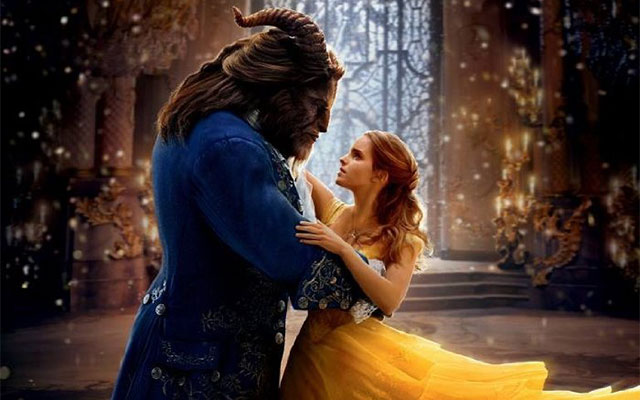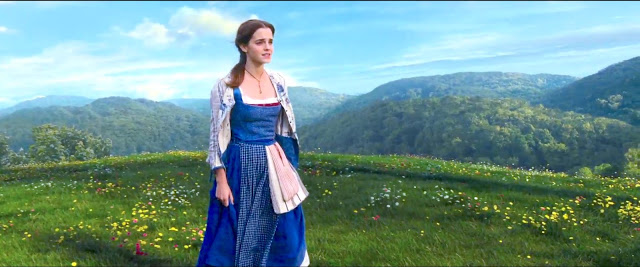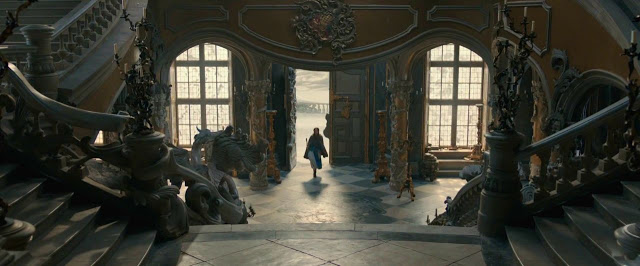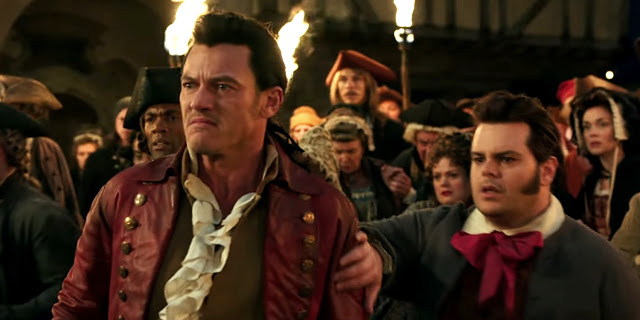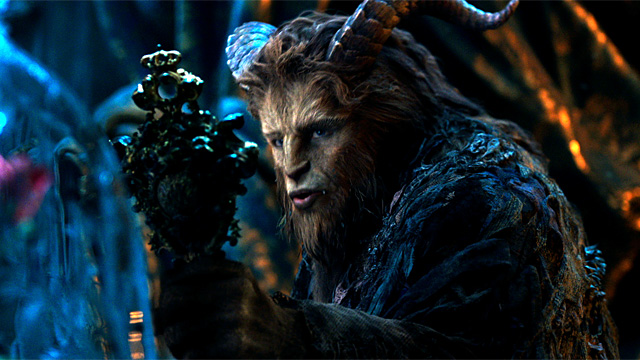“You can’t judge people by who their father is,” Mrs. Potts sagely intones. This preoccupation with parentage is new to this version of Beauty and the Beast, Bill Condon’s half-enchanting, half-enervating remake of the 1991 animated classic. But while Mrs. Potts’ wisdom is undeniable—she speaks in the voice of Emma Thompson, after all—it is impossible to view this latest child of Disney without considering the long shadow cast by its progenitor. Every work of art must be judged on its own terms, yet the question lingers: Was there a genuine reason to make this movie, an artistic justification beyond the piles of cash that the studio is already raking in? Or, to turn another of Mrs. Potts’ observations into a question, is there something there that wasn’t there before?
Yes and no. Operating under the all-seeing mandate of a corporate overlord, Condon and his screenwriters, Stephen Chbosky and Evan Spiliotopoulos, have transported the original’s two-dimensional drawings into spit-and-glue live action with a predictable degree of fidelity. This immediately lowers the remake’s ceiling; imitation may be the sincerest form of flattery, but it is perhaps the laziest form of filmmaking. Yet this new incarnation of Beauty and the Beast, while expectedly faithful to the original, is not entirely a retread. Narratively, it has some additional backstory, which is arguably extraneous but which nevertheless adds heft to the movie’s thematic interest in the bond between parents and their offspring. Musically, beyond the instantly hummable hits from one of the biggest-selling soundtracks of the ’90s, it exhibits a handful of original songs, several of which are lousy but a few of which are actually pretty good. And of course, it features the services of a litany of estimable British and American actors, who help imbue an otherwise commercial enterprise with artisanal craft.
Most prominently, it has Emma Watson, and that’s a good start. She of course plays Belle, the beautifully odd, plainly beautiful lass who wanders about the agreeably prosaic French village of Villeneuve. In the original, Belle’s purported strangeness and humble background helped distinguish her from the assembly line of Disney princesses, but here, Watson plays her as a fairly conventional heroine—headstrong yet noble, and less interested in matrimony than in literature and education. Belle is a worthy role model for young girls, but she’s also something of a blank slate, and Watson’s performance is consequently reactive. That’s fine—her features remain remarkably expressive, and here, she uses them primarily to convey her perpetual astonishment at the wonders of the world around her.
There’s quite a bit to take in. Beauty and the Beast may be a mercenary enterprise, but it spends its own money wisely, with Condon hiring some of the best in the business. The costumes, by Joe Wright’s regular designer Jacqueline Durran, are sumptuous, echoing the original’s look while providing some weight and texture. The production design by Sarah Greenwood (another Wright fixture) is extraordinary, especially the central castle, a marvel of rough stone turrets and gleaming marble staircases. Overall, the film possesses a tangible magnificence that helps offset the nagging sensation that you’ve seen all of this before.
And heard it, too. Mouse House legend Alan Menken has returned to score the picture, and while some of his music is new to this version, it’s the greatest hits that people came to see. As a millennial who was weaned on the soundtracks of the Disney Renaissance, I experienced a strange dissonance watching those hits unfold in live action. As a matter of philosophy, I tend to object to the assiduous recreation of canonical favorites, an undertaking that is fundamentally sheepish and safe. Yet watching Belle run through the streets and prairies of her homeland, plaintively seeking something more than this provincial life, it is nigh impossible not to be swept up in a kind of sing-along joy. Watson has a slightly pinched singing voice, but her body language and facial expressions capture Belle’s inner yearning, and Condon, who directed Dreamgirls and worked on Chicago, proves a capable choreographer of song and dance.
Unfortunately, he is less adept at staging drama and comedy. Whenever the music stops, Beauty and the Beast tends to move in fits and starts, lurching rather than gliding. As I need scarcely tell you, the movie operates on dual fronts: After searching for her missing father, Maurice (Kevin Kline, and speaking of dissonance, he plays a polite Englishman), Belle finds herself imprisoned within the ominous castle ruled by the Beast (Dan Stevens), a former prince who has been transformed into a horned monster. Meanwhile, back in Villeneuve, the loutish Gaston (Luke Evans, uneven) agitates the townspeople, plotting to commit Maurice to the asylum and obtain Belle’s hand in marriage, even though he’s adored by countless women, not to mention by his sycophantic minion, LeFou (Josh Gad, helpless).
Condon lays out the proceedings comfortably enough, but in attempting to articulate his characters, he never seems to find his rhythm. This is especially true of the material involving Gaston and LeFou. With a fulsome baritone, Evans is the best singer in the cast, but he struggles to imbue his heavy with the wily menace that the villain requires; ironically, Gaston’s misogynistic evil only feels more cartoonish when given flesh and blood. And the dialogue between Gaston and LeFou is terribly stilted, striving for witty banter but never exhibiting the proper timing.
Belle and the Beast fare better, perhaps because they talk less. Their nascent romance was never especially plausible, but Condon supplies some extra shading this time around; in one scene, the erudite hostage and her soulful captor bond over their shared love of Shakespeare, while in another, they magically revisit Belle’s childhood home, a modest abode haunted by grief. This new material makes intellectual sense, but despite sensitive performances from Watson and Stevens, it never really flows. Instead, the movie grows to resemble a strange, anticipatory waiting game—you tolerate the new stuff, but really you’re just craving that next memorable sequence, whether it’s Belle descending the stairs in a breathtaking yellow evening gown, or the candelabra Lumière (Ewan McGregor, parrying suitably with Ian McKellen’s Cogsworth) presenting Belle with her dinner. (The latter in fact proves a surprising letdown; while Condon stages most of the classic songs with alacrity, he stumbles with “Be Our Guest”, a number that’s more clamorous than joyous.)
To be clear, I am not suggesting that Condon should have adopted a slavish approach and reconstructed the original shot for shot—that would have resulted in a tale as moldy as grime. Yet by the time Beauty and the Beast reaches the stultifying battle that dominates its hectic third act, you may find yourself questioning the reason for its existence, even as you’re enjoying yourself. Viewed in the right light, this is a perfectly entertaining movie, and visually speaking, it’s downright glamorous. But behind its fair façade, I’m afraid it’s rather off.
Jeremy Beck is the editor-in-chief of MovieManifesto. He watches more movies and television than he probably should.

